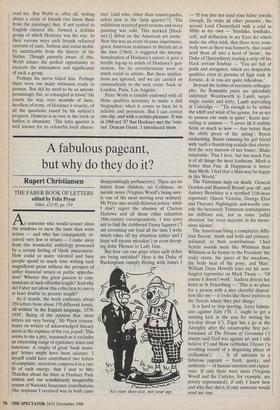A fabulous pageant, but why do they do it?
Rupert Christiansen
THE FABER BOOK OF LETTERS edited by Felix Pryor
Faber, £12.95, pp. 319
As someone who would sooner clean the windows or mow the lawn than write letters — and who has consequently re- ceived very few in return — I came away from this wonderful anthology possessed by a certain feeling of blank amazement. How could so many talented and busy people spend so much time writing such magnificent prose without the prospect of either financial return or public approba- tion? Whence this great passion to com- municate at such effortful length? And why did Faber not allow this collection to run to at least double its present length?
As it stands, the book embraces about 250 letters from about 170 different hands, all written 'in the English language, 1578- 1939'. Being of the opinion that 'most letters are very boring', Mr Pryor concen- trates on writers of acknowledged literary merit at the expense of the vox populi. This seems to me a pity, inasmuch as it excludes an interesting range of epistolary tones and functions. A couple of good 'bank mana- ger' letters might have been salutary. I myself could have contributed two letters of complaint, invectives composed in a rare fit of such energy, that I sent to Mrs Thatcher about the litter at Finsbury Park station and our scandalously inequitable system of National Insurance contributions (the response I received was in both cases disappointingly perfunctory). There are no letters from children, no Collinses, no suicide notes (Virginia Woolfs being sure- ly one of the most moving ever written). Mr Pryor also avoids fictional letters: while I don't regret the absence of Clarissa Harlowe and all those other relentless 18th-century correspondents, I was sorry not to find the clobbered Fanny Squeers CI am screaming out loud all the time I write which takes off my attention rather and I hope will excuse mistakes') or even droop- ing John Thomas to Lady Jane.
But how can one gripe when such riches are being unfolded? Here is the Duke of Buckingham camply flirting with James I 'Act your shoe-size, not your age,' — 'If you doe not send your babie jeweils enough, Ile stope all other presents'; the second Lord Chesterfield with a cold as filthy as my own — 'headake, touthake, coff, and defluction in my Eyes &c which make me often wish, that there were some body now as there was formerly, that could send them all into a herd of Swine'; the Duke of Queensberry tearing a strip off his black servant Soubise — 'You are full of pride and arrogance, which are despicable qualities even in persons of high rank & fortune, & in you are quite ridiculous.'
Beyond the realms of eccentric orthogra- phy, the Romantic poets are splendidly exhibited: Wordsworth to Lamb, surpri- singly caustic and witty; Lamb marvelling at Coleridge — "Tis enough to be within the whiff and wind of his genius, for us not to possess our souls in quiet'; Keats mar- velling at autumn — 'I never lik'd stubble fields so much as now — Aye better than the chilly green of the spring'; Byron enchanting, Burns ramming his girl friend with 'such a thundering scalade that electri- fied the very marrow of her bones', Blake inimitable: 'Fun I love, but too much Fun is of all things the most loathsom. Mirth is better than Fun, & Happiness is better than Mirth. I feel that a Man may be happy in this World.'
The Victorians harp on death. General Gordon and Branwell Brontë pop off, and Aubrey Beardsley is a terrified 11th-hour repentant; Queen Victoria, George Eliot and Florence Nightingale awkwardly con- sole the bereaved; Tennyson contemplates his stillborn son, not as some 'pallid abortion' but 'even majestic in his myste- rious silence'.
The Americans bring a completely diffe- rent flavour, brash and bold and primary- coloured, to their contributions. Chief Seattle sounds more like Whitman than Whitman as he hymns to the President 'the rocky crests, the juices of the meadows, the body heat of the pony, and Man'. William Dean Howells tries out his new- fangled typewriter on Mark Twain — 'Of course it doesn't work'. Isadora detests her hotel in St Petersburg — 'This is no place for a person with a nice cheerful disposi- tion like me — it looks like those parlors in the Novels where they plot things.'
It is hard to stop quoting. Joyce fulmin- ates against Italy ('H. j. ought to get a running kick in the arse for writing his tea-slop about it'), Elgar has a go at the Almighty after the catastrophic first per- formance of The Dream of Gerontius CI always said God was against art and I still believe it') and Shaw rubbishes Ulysses Ca revolting record of a disgusting phase of civilisation). . . . It all amounts to a fabulous pageant — fresh, quirky, and authentic — of human emotion and experi- ence. If only there were more (Virginia Woolf and the Carlyles, for example, are poorly represented); if only I knew how and why they did it; if only someone would send me one.










































































































 Previous page
Previous page